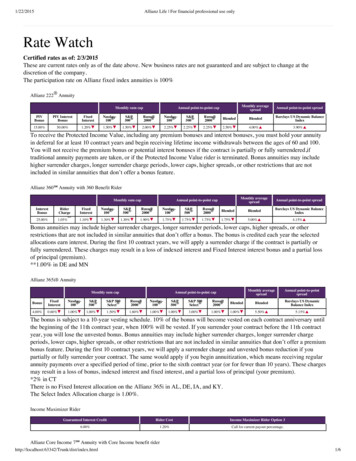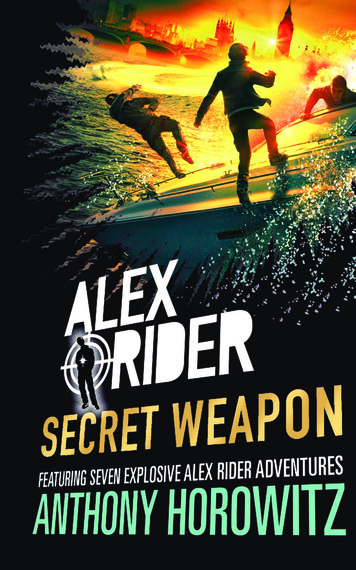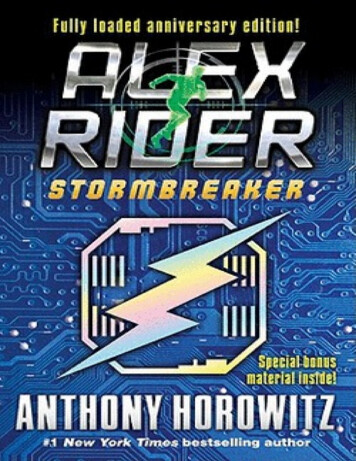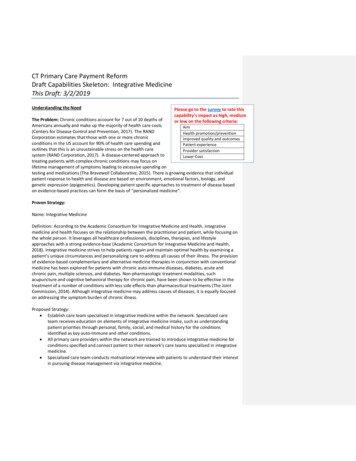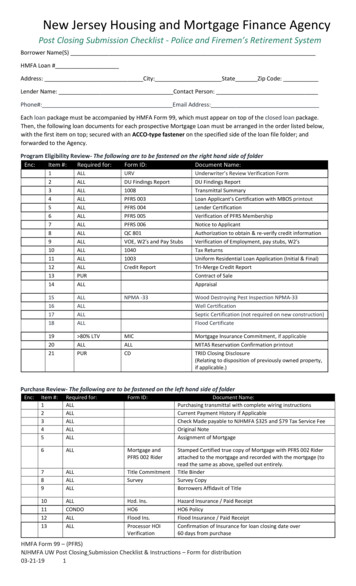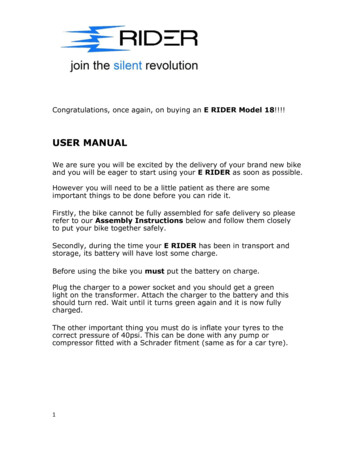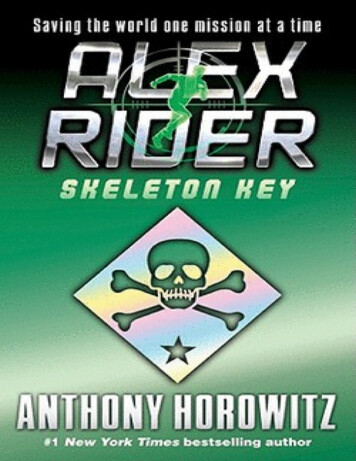
Transcription
Skeleton KeyAlex Rider [3]Anthony HorowitzPuffin (2011)Young adult fiction, Tennis, Sports Recreation, Fiction, Political Science, Terrorism, Europe,Law Crime, Political Freedom Security, Miscellaneous, Spies, Rider; Alex (Fictitiouscharacter), Orphans, Juvenile Fiction, Mysteries Detective Stories, Orphans Foster Homes,People Places, Spies - Great Britain, England, Family, Action Adventure, General, Tennisstories, Spy storiesTags:Young adult fictionttt Tennisttt Sports Recreationttt Fictionttt Political Sciencettt TerrorismtttEuropettt Law Crimettt Political Freedom Securityttt Miscellaneousttt Spiesttt Rider; Alex(Fictitious character)ttt Orphansttt Juvenile Fictionttt Mysteries Detective Storiesttt OrphansFoster Homesttt People Placesttt Spies - Great Britainttt Englandttt Familyttt ActionAdventurettt Generalttt Tennis storiesttt Spy storiestttFrom School Library JournalGrade 5-10-Fans of Horowitz's Stormbreaker (2001) and Point Blank (2002, both Philomel), andnewcomers to the series alike, will not be disappointed with this rip-roaring escapade featuring the14-year-old spy. Trying to return to a "normal" life as a schoolboy after a mere four weeks since hislast MI6 adventure, Alex Rider is recruited right off the soccer field to check out some suspiciousgoings-on at Wimbledon. This assignment catapults him into a series of life-threatening episodes,such as coming face to face with a great white shark, dodging bullets as he dives off a burning boat,and being tied to a conveyor belt that is moving toward the jaws of a gigantic grindstone in anabandoned sugar factory. Soon the teen is single-handedly taking on his most dangerous enterpriseyet. His mission is nothing short of saving the world from a nuclear attack, engineered by thepsychopathic and egomaniacal former commander of the Russian army. Alex is armed only with a fewspecially designed gadgets, which are disarmingly age-appropriate: a Gameboy that doubles as aGeiger counter, a cell phone whose aerial shoots out a drugged needle that is activated by pressing999, a Tiger Woods figurine that doubles as a small grenade when its head is twisted just so. Thispage-turning thriller leaves readers breathless with anticipation. When at last Alex returns home, hislove interest, Sabina Pleasure, asks where he has been. "Well, I was, sort of- busy," he replies in aclassic, understated, James Bond kind of way.Elizabeth Fernandez, Brunswick Middle School, Greenwich, CTCopyright 2003 Reed Business Information, Inc.FromGr. 6-9. Fourteen-year-old British secret agent Alex Rider, last heard from in Point Blank (2002), isback in another adventure. This time he's on an island near Cuba where he's up against a retiredRussian general who plans to set off a nuclear device and, in the ensuing world chaos, take over the
Russian government and restore the Soviet Empire. The general takes a shine to Alex once they meet,however, and he offers to adopt him as his son. Of course, this is the man's fatal mistake; Alex is thereat the crucial moment to thwart the general's plans. This series unabashedly lifts details from theJames Bond formula (minus the vodka martinis and casual sex) and transfers them to a novel foryoung adults. Yet, the Bond formula is the most successful in entertainment history, and there's nodoubting the appeal of this action-packed spy novel. Todd MorningCopyright American Library Association. All rights reserved
Table of ContentsIN THE DARKMATCH POINTBLOOD AND STRAWBERRIESTHE CRIBBERTWO WEEKS IN THE SUNNOT SO SPECIAL AGENTSDEATH OF A SALESMANBROTHERHOOD SQUARETHE DEVIL S CHIMNEYTHE CRUSHERTHE HOUSE OF SLAVESHEARTBEATTHE NUCLEAR DUSTBINSECURITY NIGHTMARETHE END OF THE WORLDAFTER ALEX
IN THE DARKNight came quickly to Skeleton Key.The sun hovered briefly on the horizon, then dipped below. At once, the clouds rolled in—first red,then mauve, silver, green and black as if all the colours in the world were being sucked into a vastmelting pot. A single frigate bird soared over the mangroves, its own colours lost in the chaos behindit. The air was close. Rain hung waiting. There was going to be a storm.The single engine Cessna Skyhawk SP circled twice before coming in to land. It was the sort of planethat would barely have been noticed, flying in this part of the world. That was why it had beenchosen. If anyone had been curious enough to check the registration number printed under the wing,they would have learned that this plane belonged to a photographic company based in Jamaica. Thiswas not true. There was no company and it was already too dark to take photographs.There were three men in the aircraft. They were all dark skinned, wearing faded jeans and loose,open-neck shirts. The pilot had long black hair, deep brown eyes and a thin scar running down theside of his face. He had met his two passengers only that afternoon. They had introduced themselvesas Carlo and Marc but he doubted these were their real names. He knew that their journey had beguna long time ago, somewhere in Eastern Europe. He knew that this short flight was the last leg. Heknew what they were carrying. Already, he knew too much.The pilot glanced down at the multifunction display in the control panel. The illuminated computerscreen was warning him of the storm that was closing in. That didn t worry him. Low clouds and raingave him cover. The authorities were less vigilant during a storm. Even so, he was nervous. He hadflown into Cuba many times, but never here. And tonight he would have preferred to have been goingalmost anywhere else.Cayo Esqueleto. Skeleton Key.There it was, stretching out before him, thirty-eight kilometres long and nine kilometres across at itswidest point. The sea around it, which had been an extraordinary, brilliant blue until a few minutesago, had suddenly darkened, as if someone had thrown a switch. Over to the west, he could make outthe twinkling lights of Puerto Madre, the island s second biggest town. The main airport was furthernorth, outside the capital of Santiago. But that wasn t where he was heading.He pressed on the joystick and the plane veered to the right, circling over the forests and mangroveswamps that surrounded the old, abandoned airport at the bottom end of the island.The Cessna had been equipped with a thermal intensifier, similar to the sort used in American spysatellites. He flicked a switch and glanced at the display. A few birds appeared as tiny pinpricks ofred. There were more dots pulsating in the swamp. Crocodiles or perhaps manatees.And a single dot about twenty metres from the runway. He turned to speak to the man called Carlo butthere was no need. Carlo was already leaning over his shoulder, staring at the screen.Carlo nodded. There was only one man waiting for them, as agreed. Anyone hiding within a fewhundred metres of the airstrip would have shown up. It was safe to land.The pilot looked out of the window and there was the runway. It was a rough strip of land on the edge
of the coast, hacked out of the jungle and running parallel with the sea. The pilot would have missed italtogether in the dying light but for the two lines of electric bulbs burning at ground level, outliningthe path for the plane.The Cessna swooped out of the sky. At the last minute it was buffeted about by a sudden, damp squallthat had been sent to try the pilot s nerve. The pilot didn t blink and a moment later the wheels hit theground and the plane was bouncing and shuddering along, dead centre between the two rows of lights.He was grateful they were there. The mangroves—thick bushes, half-floating on pools of stagnantwater—came almost to the edge of the runway. Go even a couple of metres in the wrong direction anda wheel might snag. It would be enough to destroy the plane.The pilot flicked switches. The engine died and the twin-bladed propellers slowed down and came toa halt. He looked out of the window. There was a jeep parked next to one of the buildings and it washere that the single man—the red dot on his screen—was waiting. He turned to his passengers.“He s there.”The older of the two men nodded. Carlo was about thirty years old with black, curly hair. He hadn tshaved. Stubble the colour of cigarette ash clung to his jaw. He turned to the other passenger. “Marc?Are you ready?”The man who called himself Marc could have been Carlo s younger brother. He was barely twentyfive and although he was trying not to show it, he was scared. There was sweat on the side of hisface, glowing green as it caught the light from the control panel. He reached behind him and took out agun, a German-built 10mm Glock automatic. He checked it was loaded, then slipped it into thewaistband at the back of his trousers, under his shirt.“I m ready,” he said.“There is only him. There are two of us.” Carlo tried to reassure Marc. Or perhaps he was trying toreassure himself. “We re both armed. There is nothing he can do.”“Then let s go.”Carlo turned to the pilot. “Have the plane ready,” he commanded. “When we walk back, I will giveyou a sign.” He raised a hand, one finger and thumb forming an 0. “That is the signal that our businesshas been successfully concluded. Start the engine at that time. We don t want to stay here one secondlonger than we have to.”They got out of the plane. There was a thin layer of gravel on the runway which crunched beneaththeir combat boots as they walked round the side to the cargo door. They could feel the sullen heat inthe air, the heaviness of the night sky. The island seemed to be holding its breath.Carlo reached up and opened a door. In the back of the plane was a black container, about one metreby two. With difficulty, he and Marc lowered it to the ground.The younger man looked up. The lights on the landing strip dazzled him but he could just make out afigure standing still as a statue beside the jeep, waiting for them to approach. He hadn t moved sincethe plane had landed. “Why doesn t he come to us?” he asked.Carlo spat and said nothing.There were two handles, one on either side of the container. The two men carried it between them,
walking awkwardly, bending over their load. It took them a long time to reach the jeep.But at last they were there. For a second time, they set the box down.Carlo straightened up, rubbing his palms on the side of his jeans. “Good evening, General,” he said.He was speaking in English. This was not his native language. Nor was it the general s. But it was theonly language they had in common.“Good evening.” The general did not bother with names that he knew would be false anyway.“You had no trouble getting here?”“No trouble at all, General.”“You have it?”“One kilogram of weapons grade uranium. Sufficient to build a bomb powerful enough to destroy acity. I would be interested to know which city you have in mind.”General Alexei Sarov took a step forward and the lights from the runway illuminated him. He was nota big man, yet there was something about him that radiated power and control. He still carried withhim his years in the army. They could be seen in his close-cut, iron grey hair, his watchful pale blueeyes, his almost emotionless face. They were there in the very way he carried himself. He wasperfectly poised; relaxed and wary at the same time. General Sarov was sixty-two years old butlooked twenty years younger. He was dressed in a dark suit, a white stmt and a narrow dark blue tie.In the damp heat of the evening, his clothes should have been creased.He should have been sweating. But to look at him, he could have just stepped out of an airconditioned room.He crouched down beside the container, at the same time producing a small device from his pocket. Itlooked like a car cigarette lighter with a dial attached. He found a socket in the side of the box andplugged the device in. Briefly, he examined the dial. He nodded. It was satisfactory.“You have the rest of the money?” Carlo asked.“Of course.” The general straightened up and walked over to the jeep. Carlo and Marc tensedthemselves—this was the moment when he might produce a gun. But when he turned round he washolding a black leather attaché-case. He flicked the locks and opened it. The case was filled withbanknotes: one hundred dollar bills neatly banded together in packets of fifty. One hundred packets inall. A total of half a million dollars. More money than Carlo had ever seen in his life.But still not enough.“We ve had a problem,” Carlo said.“Yes?” Sarov did not sound surprised.Marc could feel the sweat as it drew a comma down the side of his neck. A mosquito was whining inhis ear but he resisted the urge to slap it. This was what he had been waiting for. He was standing afew steps away, his hands hanging limply by his side. Slowly, he allowed them to creep behind him,closer to the concealed gun. He glanced at the ruined buildings. One might once have been a controltower. The other looked like a customs shed. Both of them were broken and empty, the brickworkcrumbling, the windows smashed. Could there be someone hiding there? No. The thermal intensifier
would have shown them. They were alone.“The cost of the uranium.” Carlo shrugged. “Our friend in Miami sends his apologies. But there arenew security systems all over the world. Smuggling—particularly this sort of thing—has becomemuch more difficult. And that s meant extra expense.”“How much extra expense?”“A quarter of a million dollars.”“That s unfortunate.”“Unfortunate for you. General. You re the one who has to pay.”Sarov considered. “We had an agreement.” he said.There was a long silence. Marc s fingers reached out behind his back, closing around the Glockautomatic. But then Sarov nodded. “I will have to raise the money,” he said.“You can have it transferred to the same account that we used before,” Carlo said. “But I have towarn you, General. If the money hasn t arrived in three days, the American intelligence services willbe told what has happened here tonight what you ve just received. You may think you are safe hereon this island. I can assure you, you won t be safe any more.”“You re threatening me,” Sarov muttered. There was something at once calm and deadly in the way hespoke.“It s nothing personal,” Carlo said.Marc produced a cloth bag. He unfolded it, then tipped the money out of the case and into the bag. Thecase might contain a radio transmitter. It might contain a small bomb. He left it behind.“Good night, General,” Carlo said.“Good night.” Sarov smiled. “I hope you enjoy the flight.”The two men walked away. Marc could feel the money, the bundles pressing through the cloth againstthe side of his leg. “The man s a fool,” he whispered, returning to his own language.“An old man. Why were we afraid?”“Let s just get out of here,” Carlo said. He was thinking about what the general had said: I hope youenjoy the flight. Had he been smiling when he said that?He made the agreed signal, pressing his finger and thumb together. At once the Cessna s enginestarted up.General Sarov was still watching them. He hadn t moved, but now his hand reached once again intohis jacket pocket. His fingers closed around the radio transmitter waiting there. He had wondered if itwould be necessary to kill the two men and their pilot. Personally, he would have preferred not to,even as an insurance policy. But their demands had made it necessary. He should have known theywould be greedy. Given the sort of people they were, it was almost inevitable.Back in the plane, the two men were strapping themselves into their seats while the pilot prepared fortake-off. Carlo heard the engine rev up as the plane slowly began to turn. Far away, there was a lowrumble of thunder. Now he wished that they had turned the plane round immediately after they had
landed. It would have saved some precious seconds and he was eager to be away.Back in the air.I hope you enjoy the flight.There had been no emotion whatsoever in the general s voice. He could have meant what he wassaying. But Carlo guessed he would have spoken exactly the same way if he had been passing asentence of death.Next to him, Marc was already counting the money, running his hands through the piles of notes.He looked back at the ruined buildings, at the waiting jeep. Would Sarov try something? What sort ofresources did he have on the island? But as the plane turned in a tight circle, nothing moved. Thegeneral stayed where he was. There was nobody else in sight.The runway lights went out.“What the ?” The pilot swore viciously.Marc stopped his counting. Carlo understood at once what was happening. “He s turned the lightsoff,” he said. “He wants to keep us here. Can you take off without them?”The plane had turned a half-circle so that it was facing the way it had come. The pilot stared outthrough the cockpit window, straining to see into the night. It was very dark now, but there was anugly, unnatural light pulsating in the sky. He nodded. “It won t be easy, but ”The lights came back on again.There they were, stretching into the distance, an arrow that pointed to freedom and an extra profit of aquarter of a million dollars. The pilot relaxed. “It must have been the storm,” he said. “It disruptedthe electricity supply.”“Just get us out of here,” Carlo muttered. “The sooner we re in the air, the happier I ll be.”The pilot nodded. “Whatever you say.” He pressed down on the controls and the Cessna lumberedforward, picking up speed quickly. The runway lights blurred, guiding him forward.Carlo settled back into his seat. Marc was watching out of the window.And then, seconds before the wheels left the ground, the plane suddenly lurched. The whole worldtwisted as a giant, invisible hand seized hold of it and wrenched it sideways. The Cessna had beentravelling at one hundred and fifty kilometres per hour. It came to a grinding halt in a matter ofseconds, the deceleration throwing all three men forward in their seats. If they hadn t been belted in,they would have been hurled out of the front window—or what was left of the shattered glass. At thesame time there was a series of ear-shattering crashes as something whipped into the fuselage. One ofthe wings had dipped down and the propeller was torn off, spinning into the night. Suddenly the planewas still, resting tilted on one side.For a moment, nobody moved inside the cabin. The plane s engines rattled and stopped. Then Marcpulled himself up in his seat. “What happened?” he screamed. “What happened?” He had bitten histongue. Blood trickled down his chin. The bag was still open and money had spilled into his lap.“I don t understand ” The pilot was too dazed to speak.
“You left the runway!” Carlo s face was twisted with shock and anger.“I didn t!”“There!” Marc was pointing at something and Carlo followed his quivering finger. The door on theunderside of the plane had buckled. Black water was seeping in underneath, forming a pool aroundtheir feet.There was another rumble of thunder, closer this time.“He did this!” the pilot said.“What did he do?” Carlo demanded.“He moved the runway!”It had been a simple trick. As the plane had turned, Sarov had switched off the lights on the runwayusing the radio transmitter in his pocket. For a moment, the pilot had been disoriented, lost in thedarkness. Then the plane had finished its turn and the lights had come back on. But what he hadn tknown, what he wouldn t have been able to see, was that it was a second set of lights that had beenactivated—and that these ran off at an angle, leaving the safety of the runway and continuing over thesurface of the swamp.“He led us into the mangroves,” the pilot said.Now Carlo understood what had happened to the plane. The moment its wheels touched the water, itsfate had been sealed. Without solid ground beneath it, the plane had become bogged down andtoppled over. Swamp water was even now pouring in as they slowly sank beneath the surface. Thebranches of the mangrove trees that had almost torn the plane apart surrounded them, bars of a livingprison.“What are we going to do?” Marc demanded, and suddenly he was sounding like a child. “We regoing to drown!”“We can get out!” Carlo had suffered whiplash injuries in the collision. He moved one arm painfully,unfastening his seat-belt.“We shouldn t have tried to cheat him!” Marc cried. “You knew what he was. You were told—“Shut up!” Carlo had a gun of his own. He pulled it out of the holster underneath his shirt andbalanced it on his knee. “We ll get out of here and we ll deal with him. And then somehow we ll finda way off this damn island.”“There s something ” the pilot began.Something had moved outside.“What is it?” Marc whispered.“Shhh!” Carlo half stood up, his body filling the cramped space of the cabin. The plane tilted again,settling further into the swamp. He lost his balance then steadied himself. He reached out, past thepilot, as if he was going to climb out of the broken front window.Something huge and horrible lunged towards him, blocking out what little light there was in the nightsky. Carlo screamed as it threw itself head first into the plane and onto him. There was a glint of
white and a dreadful grunting sound. The other men were screaming too.General Sarov stood watching. It wasn t raining yet but the water was heavy in the air. There was aflash of lightning that seemed to cross the sky almost in slow motion, relishing its journey.In that moment, he saw the Cessna on its side, half-buried in the swamp. There were now half a dozencrocodiles swarming all over it. The largest of them had dived head first into the cockpit.Only its tail was visible, thrashing about as it gorged itself.He reached down and lifted up the black container. Although it had taken two men to carry it to him, itseemed to weigh nothing in his hands. He placed it in the jeep, then stood back. He allowed himselfthe rare privilege of a smile and felt it, briefly, on his lips. Tomorrow, when the crocodiles hadfinished their meal, he would send in his field workers—the macheteros—to recover the banknotes.Not that the money was important. He was the owner of one kilogram of weapons grade uranium. AsCarlo had said, he now had the power to destroy a small city.But Sarov had no intention of destroying a city.His target was the entire world.
MATCH POINTAlex caught the ball on the top of his chest, bounced it forward and kicked it into the back of the net. Itwas then that he noticed the man with the large white dog. It was a warm, bright Friday afternoon, theweather caught between late spring and early summer. This was only a practise match but Alex tookthe game seriously. Mr. Wiseman, who taught PE, had selected him for the first team and he waslooking forward to playing against other schools in west London.Unfortunately, his school, Brookland, didn t have its own playing fields. This was a public field andanyone could walk past. And they could bring their dogs. Alex recognized the man at once and hisheart sank. At the same time he was angry. How could he have the nerve to come here, into the schoolarena, in the middle of a game? Weren t these people ever going to leave him alone?The man s name was Crawley. With his thinning hair, blotchy face and old-fashioned clothes, helooked like a junior army officer or perhaps a teacher in a second-rate private school. But Alex knewthe truth. Crawley belonged to MI6. Not exactly a spy, but someone who was very much a part of thatworld. Crawley was an office manager in one of the country s most secret offices. He did thepaperwork, made the arrangements, set up the meetings. When someone died with a knife in their backor a bullet in their chest, it would be Crawley who had signed on the dotted line.As Alex ran back to the centre line, Crawley walked over to a bench, dragging the dog behind.The animal didn t seem to want to walk. It didn t want to be there at all. Crawley sat down. He wasstill sitting there ten minutes later when the final whistle blew and the game came to an end.Alex considered for a moment. Then he picked up his jersey and went over to him.Crawley seemed surprised to see him. “Alex!” he exclaimed. “What a surprise! I haven t seen yousince well, since you got back from France.”It had only been four weeks since MI6 had forced Alex to investigate a school for the super-rich insouth-east France. Using a false name, he had become a student at the Point Blanc Academy only tofind himself taken prisoner by the mad headmaster, Dr Grief. He had been chased down a mountain,shot at and almost dissected alive in a biology class. Alex had never wanted to be a spy and thewhole business had convinced him he was right. Crawley was the last person he wanted to see.But the MI6 man was beaming. “Are you on the school team? Is this where you play? I m surprised Ihaven t noticed you before. Barker and I often walk here.”“Barker?”“The dog.” Crawley reached out and patted it. “He s a Dalmatian.”“I thought Dalmatians had spots.”“Not this one.” Crawley hesitated. “Actually, Alex, it s a bit of luck running into you. I wonder if Icould have a word with you?”Alex shook his head. “Forget it, Mr. Crawley. I told you the last time. I m not interested in MI6.I m a schoolboy. I m not a spy.”
“Absolutely!” Crawley agreed. “This has got nothing to do with the um company. No, no, no.”He looked almost embarrassed. “The thing is, what I wanted to ask you was how would you like afront row seat at Wimbledon?”The question took Alex completely by surprise. “Wimbledon? You mean the tennis?”“That s right.” Crawley smiled. “The All England Tennis Club. I m on the committee.”“And you re offering me a ticket?”“Yes.”“What s the catch?”“There is no catch, Alex. Not really. But let me explain.” Alex was aware that the other playerswere getting ready to leave. The school day was almost over. He listened as Crawley went on. “Thething is, you see, a week ago we had a break-in. Security at the club is always tight but someonemanaged to climb over the wall and get into the Millennium Building through a forced window.”“What s the Millennium Building?”“It s where the players have their changing rooms. It s also got a gym, a restaurant, a couple oflounges and so on. We have closed circuit television cameras but the intruder disabled the system—along with the main alarm. It was a thoroughly professional job. We d never have known anyone hadbeen there except for a stroke of luck. One of our night guards saw the man leaving. He was Chinese,in his early twenties—”“The guard?”“The intruder. Dressed from head to foot in black with some sort of rucksack on his back. The guardalerted the police and we had the whole place searched. The Millennium Building, the courts, thecafes everywhere. It took three days. There are no terrorist cells active in London at the moment,thank goodness, but there was always a chance that some lunatic might have planted a bomb. We hadthe anti-terrorist squad in. Sniffer dogs. Nothing! Whoever it was had vanished into thin air and itseemed he d left nothing behind.“Now, here s the strange thing, Alex. He didn t leave anything, but nor did he take anything. In fact,nothing seems to have been touched. As I say, if the guard hadn t seen this chap, we d never haveknown he had been there. What do you make of that?”Alex shrugged. “Maybe the guard disturbed him before he could get his hands on whatever it was hewanted.”“No. He was already leaving when he was seen.”“Could the guard have imagined it?”“We examined the cameras. The film is time-coded and we discovered that they had definitely beenout of action for two hours. From midnight until two in the morning.”“Then what do you think, Mr. Crawley? Why are you telling me this?”Crawley sighed and stretched his legs. He was wearing suede shoes, shabby and down at heel.The dog had fallen asleep. “My belief is that somebody is intending to sabotage Wimbledon this
year,” he said. Alex was about to interrupt but Crawley held up a hand. “I know it sounds ridiculousand I have to admit, the other committee members don t believe me. On the other hand, they don thave my instincts. They don t work in the same business as me. But think about it, Alex. There had tobe a reason for such a carefully planned and executed break-in. But there is no reason. Something swrong.”“Why would anyone want to sabotage Wimbledon?”“I don t know. But you have to remember, the Wimbledon tennis fortnight is a huge business.There are millions of pounds at stake. Prize money alone adds up to eight and a half million. And thenthere are television rights, merchandising rights, corporate sponsorship We get VIPs flying in fromall over the planet—everyone from film stars to presidents—and tickets for the men s final have beenknown to change hands for literally thousands of pounds. It s not just a game. It s a world event, and ifanything happened well, it doesn t bear thinking about.”Crawley obviously had been thinking about it. He looked tired. The worry was deep in his eyes.Alex thought for a moment. “You want me to look around.” He smiled. “I ve never been toWimbledon. I ve only ever seen it on TV. I d love a ticket for Centre Court. But I don t see how aone-day visit would actually help.”“Exactly, Alex. But a one-day visit isn t quite what I had in mind.”“Go on.”“Well, you see, I was wondering if you would consider becoming a ballboy.”“You re not serious?”“Why not? You can stay there for the whole fortnight. You ll have a wonderful time and you ll beright in the middle of things. You ll see some great matches. And I ll be able to relax a little, knowingyou re there. If anything is going on, there s a good chance you might spot it. Then you can call me andI ll take care of it.” He nodded. It was obvious that he had managed to persuade himself, if not Alex.“It s not as if this is dangerous or anything. I mean it s Wimbledon.There ll be plenty of other boys and girls there. What d you think?”“Don t you have enough security people already?”“Of course we have a security company. They
Gr. 6-9. Fourteen-year-old British secret agent Alex Rider, last heard from in Point Blank (2002), is back in another adventure. This time he's on an island near Cuba where he's up against a
